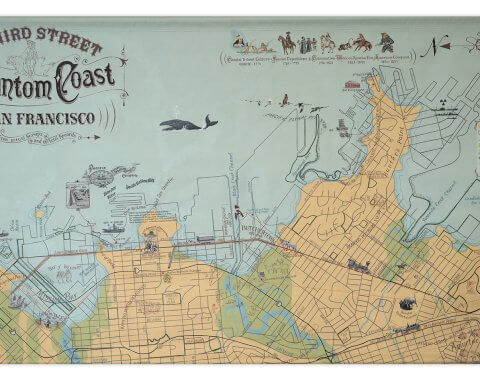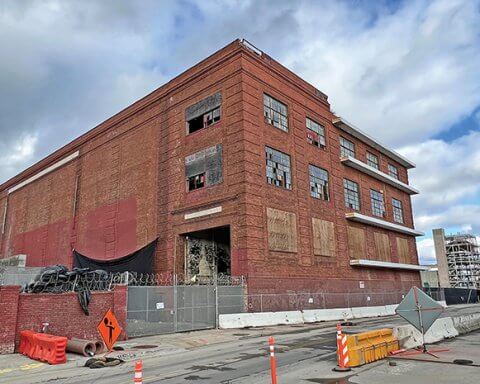Enola D. “Miz” Maxwell, Sophenia “Sophie” Maxwell, and Edward Hatter are part of a generational line of civic advocates, which began with Enola’s arrival to Potrero Hill.
Enola was born on August 30, 1919, in Baton Rouge, Louisiana. She moved with her children, Barbara and Ronnie, to San Francisco in 1949, following her mother, Lena Carmena, who had a job at a laundromat. In 1950, she gave birth to Sophie.
Enola first resided in the Haight-Ashbury District, where she served on the Haight-Ashbury Neighborhood Council. Enola befriended Hill resident and fellow activist Ruth Passen – who would become the View’s publisher – when both campaigned to stop construction of a freeway through Golden Gate Park.
Later, Enola moved to the Carolina Projects at 18th and Carolina streets. She earned a living as a house cleaner and then as a postal worker before attending divinity school at Dominican University in San Rafael.
By the mid-1960s, Enola was working with Lena at the Little Red Door, a thrift store operated by the Potrero Hill Olivet Presbyterian Church. The store was initially located at 1400 18th Street, now home to Christopher’s Books. In 1976 it relocated to 1426 18th Street, which today houses Le Marché Cezanne.
Peter Linenthal, director of the Potrero Hill Archives Project, later bought the 1400 18th Street building.
“Enola was a very nice, welcoming, and warm woman. She was also folksy and direct, and very effective at getting things done,” said Linenthal.
While attending Dominican Enola was assigned to the Potrero Hill Olivet Presbyterian Church, a house of worship she began attending in 1968, becoming its first woman and Black minister. She graduated from Dominican in 1970 and remained a minister at the church until 1971.
During her time as minister Enola set up a coffee shop in the church basement as part of a new program, Street Ministries. All comers were invited to enjoy music and discussion. Enola also served as a spiritual advisor to the Black Panther Party and got involved in the City’s civil rights movement.
Enola had been an insurance agent in Baton Rouge, a job she wasn’t able to secure in San Francisco, possibly due to racial discrimination. After she’d saved enough for a down payment on a house, she found that no real estate agent would sell her one on the Hill. She bought a home on Harrison Street instead.
In 1972, Al and Jerrie Meadows, as well as other Potrero Hill Neighborhood House board members, asked Enola to become the nonprofit’s executive director. The “Nabe,” located on De Haro Street, offered programs for children, families, and seniors. Enola became its first Black director, serving in that position until 2003, a year before she died.
“Enola was the “grande dame” who knew everyone, all the movers and the shakers,” said Edward Hatter, the Nabe’s current executive director and Enola’s grandson. “When Willie Brown was mayor, between 1996 and 2004, she could call on him at the drop of a hat. She was always pulling plugs and calling in favors to get resources for the Nabe and people on the Hill.”
Gordon Chin, who launched the Chinatown Community Development Center (Chinatown CDC) in 1977, and served as its director until 2011, fought for decades alongside Enola for affordable housing. Chin said it was hard to say “no” to her.
“Enola spoke with a forceful but quiet demeanor. People listened when she spoke. They paid attention when she spoke about Potrero Hill,” said Chin.
Brenda Berlin co-founded The Julian Theatre in 1965 with her then husband Richard Reineccius, as well as Doug Giebel and other San Francisco State University graduates. The group was invited to become the theatre-in-residence at the Nabe, where it went on to produce more than 200 plays, including new works, political plays, and plays for children. After Enola became the Nabe’s director, she continued to welcome The Julian Theatre for close to two decades.
“She was very excited about the multicultural aspects of what we were doing. We welcomed children from the community to see our shows and had a diverse group of actors. She was also impressed that we fought for funding for neighborhood arts programs, which included theaters’ presence in City neighborhoods, including the Hill,” said Berlin.
In 1986 Enola helped found the Dr. Martin Luther King, Jr. Holiday Celebration Committee. The nonprofit continues to sponsor events that raise awareness about Dr. King and promote peace.
In 2001, the San Francisco Unified School District renamed the Potrero Hill Middle School at 655 De Haro Street the Enola D. Maxwell Middle School of the Arts. The campus is located on the site of the former Carolina Projects where Enola was a resident. Since 2017, it’s been home to San Francisco International High School, which serves recent immigrants.
In the late-1990s, Sophie Maxwell, Enola’s younger daughter, was living in Bayview, working as an electrician for Amtrak. She joined San Francisco’s redevelopment project area committee, which provided community input on revitalization activities. After the committee elected her chair, U.S. Congresswoman Nancy Pelosi and then-U.S. Senator Barbara Boxer encouraged her to deepen her political engagement.
“In 2000, she initiated her run for supervisor, inspired partly by the progress Enola had made. Everyone in the neighborhood, including Enola, got behind her,” said Hatter.
Sophie Maxwell defeated City Planning Commissioner Linda Fadeke Richardson, who had been supported by then-Mayor Willie Brown.
“At the time District 10 was vast, running from the Hill down to Sunnydale. It was experiencing the crack epidemic. There were a lot of handshake deals. Sophie learned to push for what residents wanted without offending anyone. That’s what got her recognized Downtown,” said Hatter.
Sophie worked to shut down the Hunters Point and the Potrero power plants, which closed in 2006 and 2011 respectively.
Philip De Andrade, who chaired the Potrero Power Plant Citizens Advisory Task Force in the early 2000s, said Sophie’s office was an essential part of the process of shuttering the Potrero plant.
“Ruth Passen and Enola were the conscience of Potrero Hill. Sophie continued that tradition,” said De Andrade.
“Sophie also got tour buses that had operated in the San Francisco Wholesale Produce Market shut down. She did a lot of work to learn about and improve living conditions at the Potrero Hill Annex and Terrace,” said Hatter.
Sophie’s first term was two years because the City had changed from at-large to district elections. She ran unopposed in 2002. In 2006, she beat out six other candidates to be reelected.
“We worked very closely together on so many issues, from transportation and open space to affordable housing. Despite having residents of different ethnic backgrounds, the Potrero Hill and Chinatown communities saw eye to eye in so many ways,” said Chin.
After Sophie termed out of office in 2011, she joined the board of the San Francisco Information Clearinghouse (SFIC), a nonprofit that oversees the Council of Community Housing Organizations (CCHO). CCHO, also known as “Choo Choo,” is composed of 22 community-based housing developers and tenant advocates.
“Sophie and I have served on the SFIC board for many years. She has brought so much to the table, including her patience, knowledge of City politics, and advocacy for underserved communities. No one ever took anything she said personally because of the way she spoke. Whether you agree with Sophie or not, you come away respecting her,” said Chin.
This is the first part of a two-part article.



